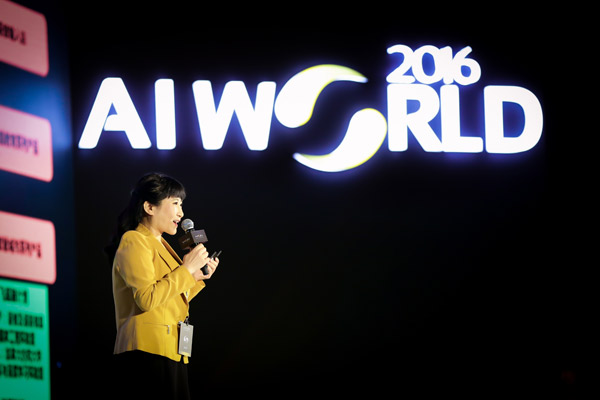

(Zheng Nanning, an academician with the Chinese Academy of Engineering Sciences, addresses the expo.)
Artificial intelligence (AI) technology has been developing rapidly in China, according to experts and business leaders at an AI expo in Beijing. These authorities acknowledge that China has become a major AI power in the world, with speech recognition technology that tops that of any other nation.
Addressing the 2016 AI World Expo, which opened on Oct. 18 in Beijing, experts like Wang Feiyue, deputy director-general at the Chinese Association of Automation (CAA), and Yang Jing, founder of Beijing-based think tank AI Era, noted that China is becoming an increasingly prominent player in AI technology.
In 2016, two of the six fellows of the Association for the Advance of Artificial Intelligence (AAAI) are overseas Chinese with foreign nationalities; another is a Chinese citizen. These numbers are especially dramatic given that the association has only made 15 Chinese people fellows since 1990, according to Yang.
At this year’s ImageNet - the Olympics of the IT world – the Chinese delegation came out on top in a variety of categories. The most prominent teams included those from the Chinese University of Hong Kong, the No. 3 Research Institute Affiliated with the Ministry of Public Security and domestic IT company SenseTime, Yang added.
In the field of speech recognition, the software of Shenzhen-based company iFLYTEK boasted 95 percent accuracy, having won multiple championships at global speech synthesizer competitions, according to the company’s president, Liu Qingfeng. Liu also said that iFLYTEK’s software is now being used in BMW, Audi and Mercedes Benz vehicles worldwide.
“I believe that human-computer interaction platforms will be mainly controlled by vocals within the next 10 years, with assistive touch on screens or keypads. AI will enter everyday life as an essential along the lines of water and electricity,” Liu said at the expo.
Liu’s speech was broadcast in real-time on a screen using the company’s speech recognition software. Containing barely any mistakes, the transcription earned much admiration at the expo.
“We need Chinese people to get into this field both in technology and economy,” said Yoshua Bengio, head of the Montreal Institute for Learning Algorithms, in a video clip sent to the expo.
“China holds a great advantage in its number of data pieces and user population, which can contribute greatly to AI development,” said Zheng Nanning, an academician with the Chinese Academy of Engineering Sciences.
Zheng pointed out that AI development is especially crucial against the background of China’s ambition to become an innovative power by 2020, and a major science power by 2030. These goals are part of a strategic development guideline on innovative power that was issued by the central government in May.

(Yang Jing, founder of Beijing-based think tank AI Era, speaks at the expo.)
Stanford University’s leading AI scientist Fei-Fei Li predicted in a video clip sent to the expo that applications dependent upon perception, such as self-driving vehicles, industrial-use robots and augmented and virtual reality, will improve a great deal in the next five to 10 years. Li also thought that the industry’s focus would shift to cognitive AI.
At a sideline panel discussion about self-driving technology, IT giant Baidu announced that it would launch another road test of its self-driving car on the open road before the end of 2016, after a successful road test on a closed ring road in Beijing in 2015, according to James Peng, a chief architect working on Baidu’s self-driving initiative.
Peng admitted that a Level 4 road test, which lacks any human assistive control, will be especially hard in China, given the complex traffic condition that are complicated by jaywalking pedestrians and overly aggressive drivers.
Nevertheless, Peng boasted that Baidu’s self-driving car has 95 percent accuracy for pedestrian detection, and 99.9 percent accuracy in traffic light reading. Not only has the car passed China’s driver’s license examination, it also took an open road test in the U.S.
“It may take several decades before Level 4 self-driving can be realized. So far, human assistive control is unavoidable in almost all self-driving cars. But it is possible that China will create the best self-driving technology, despite the challenges posed by our traffic system, which is more complicated than those of other countries,” said Yu Kai, founder of Beijing-based AI company Horizon Robotics.
 Fire brigade in Shanghai holds group wedding
Fire brigade in Shanghai holds group wedding Tourists enjoy ice sculptures in Datan Town, north China
Tourists enjoy ice sculptures in Datan Town, north China Sunset scenery of Dayan Pagoda in Xi'an
Sunset scenery of Dayan Pagoda in Xi'an Tourists have fun at scenic spot in Nanlong Town, NW China
Tourists have fun at scenic spot in Nanlong Town, NW China Harbin attracts tourists by making best use of ice in winter
Harbin attracts tourists by making best use of ice in winter In pics: FIS Alpine Ski Women's World Cup Slalom
In pics: FIS Alpine Ski Women's World Cup Slalom Black-necked cranes rest at reservoir in Lhunzhub County, Lhasa
Black-necked cranes rest at reservoir in Lhunzhub County, Lhasa China's FAST telescope will be available to foreign scientists in April
China's FAST telescope will be available to foreign scientists in April "She power" plays indispensable role in poverty alleviation
"She power" plays indispensable role in poverty alleviation Top 10 world news events of People's Daily in 2020
Top 10 world news events of People's Daily in 2020 Top 10 China news events of People's Daily in 2020
Top 10 China news events of People's Daily in 2020 Top 10 media buzzwords of 2020
Top 10 media buzzwords of 2020 Year-ender:10 major tourism stories of 2020
Year-ender:10 major tourism stories of 2020 No interference in Venezuelan issues
No interference in Venezuelan issues
 Biz prepares for trade spat
Biz prepares for trade spat
 Broadcasting Continent
Broadcasting Continent Australia wins Chinese CEOs as US loses
Australia wins Chinese CEOs as US loses